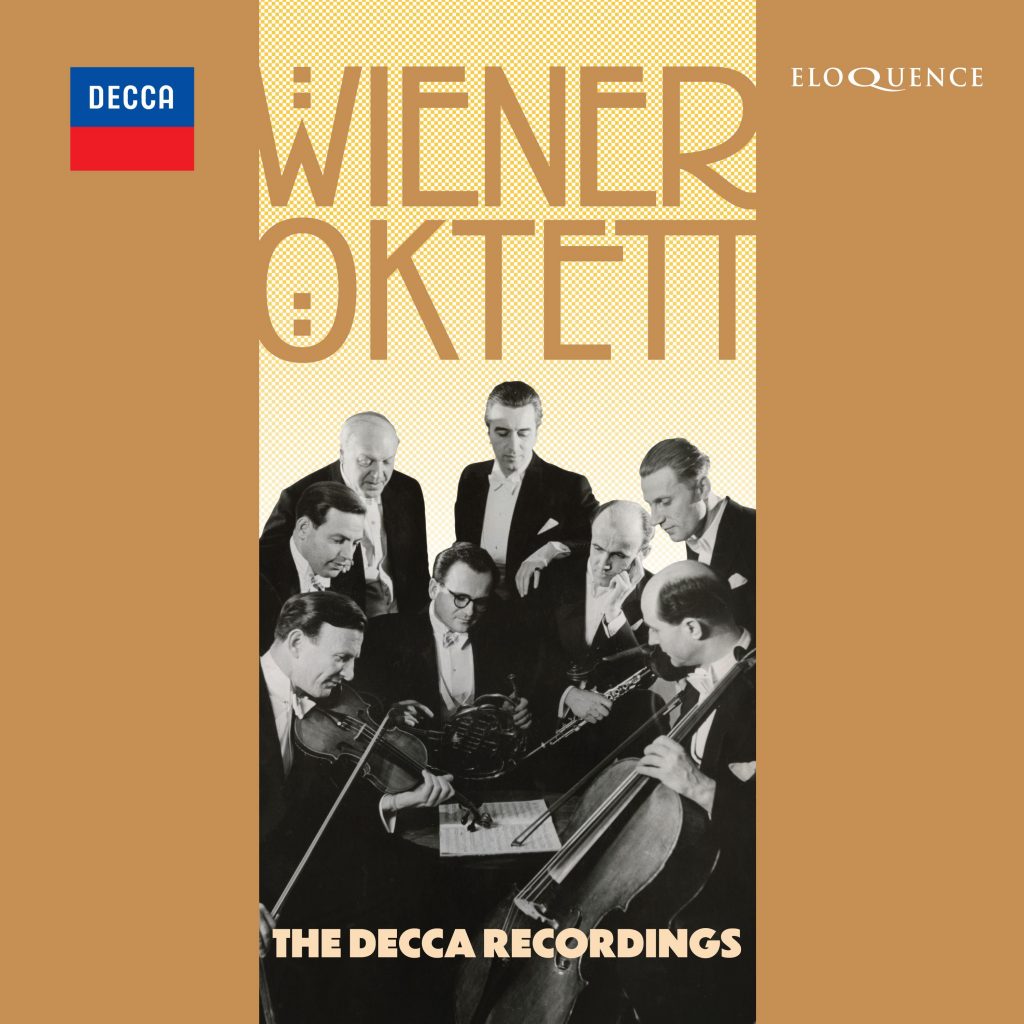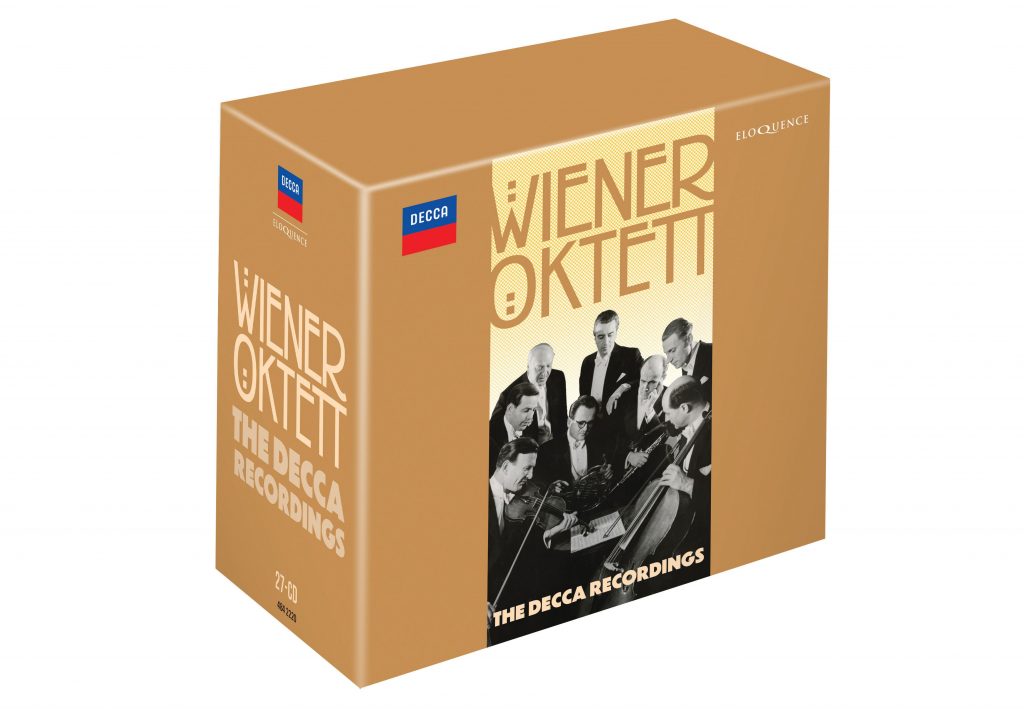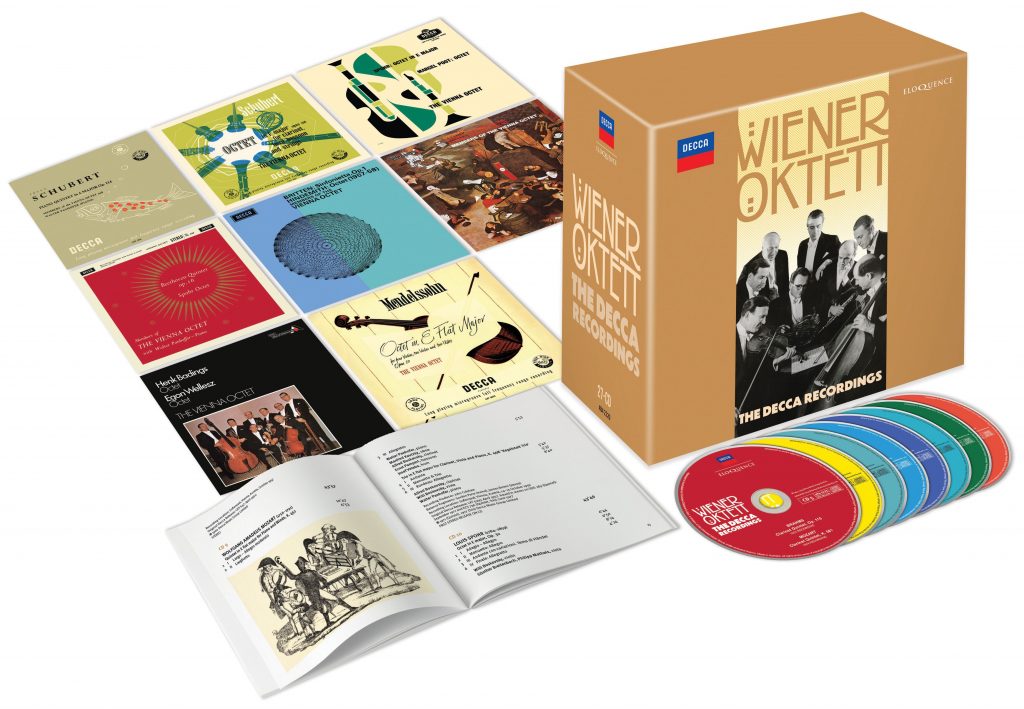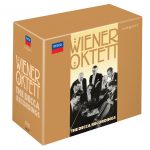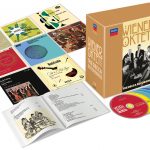LIMITED EDITION.
Decca signed an exclusive contract with the Wiener Oktett (Vienna Octet) in the summer of 1948 as a commercially motivated move: a sweetener to the deal that also poached the Philharmonic Orchestra from EMI. The ensemble had been formed only a year or so previously around the Boskovsky brothers, violinist Willi and clarinetist Alfred. Soon enough, audiences at home as well as in concert were enjoying the sound of a quintessentially Viennese ensemble, its members drawn from the ranks of the Philharmonic, in Classical-era music that could have been written for them, starting with the Septet by Beethoven and the Octet by Schubert.
The sweet, silvery tone of the Octet and the easy give-and-go of its phrasing established the Octet as the latest in a line of distinguished Viennese chamber ensembles, from the Rosé Quartet of Mahler’s era to the Barylli Quartet documented by the Westminster label. The Vienna Octet enjoyed the advantage of Decca’s top-of-the-range engineering, and they continued to set down classic interpretations of Mozart, Beethoven and Schubert through the course of the 1950s, for the new LP format and then for stereo.
In 1956 their Decca albums began to reflect the diversity of their concert programmes, with the Octet written for them by the Belgian composer Marcel Poot. While they continued to enjoy free-spirited partnerships on record with the likes of Clifford Curzon and the Viennese pianist Walter Panhofer in Schubert’s ‘Trout’ Quintet, they also recorded lesser-known Romantics such as Spohr, Kreutzer and Berwald, and modern repertoire by Britten, Hindemith and Egon Wellesz.
By the time of the Vienna Octet’s final recording in November 1972, only two members of its original lineup were left, including clarinettist Alfred Boskovsky, but critics and record buyers had continued to recognise that, especially in the central repertoire, an unselfconscious authenticity set the ensemble apart from its rivals.
RELEASED 19 JANUARY 2024
CD 1
KREUTZER Grand Septet (rec. 1951)
BEETHOVEN Septet (rec. 1951)
CD 2
MENDELSSOHN Octet (rec. 1953)
SCHUBERT Octet (rec. 1948)
CD 3
MOZART Divertimento, K. 334 (rec. 1950)
Divertimento, K. 247 (rec. 1952)
CD 4
SCHUBERT Piano Quintet (rec. 1950)
Walter Panhofer
SPOHR Nonet (rec. 1952)
CD 5
BRAHMS
Clarinet Quintet (rec. 1953)
MOZART Clarinet Quintet (rec. 1953)
Alfred Boskovsky
CD 6
SCHUBERT Octet (rec. 1954)
CD 7
BEETHOVEN Septet (rec. 1954)
DVOŘÁK String Quartet No. 10
Boskovsky Quartet
CD 8
MOZART Divertimento, K. 287 (rec. 1955)
Divertimento, K. 113
CD 9
MOZART Piano Quintet
Clarinet Trio
Walter Panhofer
FIRST STEREO RELEASE ON CD
CD 10
SPOHR Octet (rec. 1955)
POOT Octet
CD 11
SCHUBERT Octet (rec. 1958)
CD 12
SCHUBERT Piano Quintet (rec. 1957)
Sir Clifford Curzon
BEETHOVEN Septet (rec. 1959)
CD 13
BEETHOVEN Piano Quintet
Walter Panhofer
SPOHR Octet (rec. 1959)
CD 14
MOZART Divertimento, K. 334 (rec. 1961)
Divertimento, K. 136/125a
CD 15
BRAHMS Clarinet Quintet (rec. 1961)
BAERMANN Adagio
Alfred Boskovsky
CD 16
MOZART Divertimento, K. 287 (rec. 1962)
M. HAYDN Divertimento in G major
CD 17
MOZART Clarinet Quintet (rec. 1963)
Alfred Boskovsky
Divertimento, K. 247 (rec. 1963)
CD 18
MOZART March, K. 290 & Divertimento, K. 205
Cassation, K. 99
CD 19
BRITTEN Sinfonietta
HINDEMITH Octet
CD 20
SPOHR Nonet (rec. 1966)
Double Quartet
CD 21
MENDELSSOHN Piano Sextet
BORODIN Piano Quintet
Walter Panhofer
CD 22
KREUTZER Grand Septet (rec. 1968)
BERWALD Grand Septet
CD 23
DVOŘÁK String Quintet, Op. 77
SPOHR Piano Quintet
Walter Panhofer
CD 24
BEETHOVEN String Quintet
Sextet
CD 25
DVOŘÁK String Sextet, B. 80
String Quintet, B. 180
CD 26
BADINGS Octet
WELLESZ Octet
CD 27
MENDELSSOHN Octet (rec. 1972)
RIMSKY-KORSAKOV Piano Quintet
Walter Panhofer
“The modern Troyers and Schuppanzighs on Decca AK 2060-65 are a group who call themselves the Vienna Octet; and they bear the title with grace.” Musical Times, February 1949 (Schubert: Octet, 1948 recording)
“The Grand Septet is quite a find, for its most important movements, the first and last, are excellent within their sphere of discreet style and modest inspiration… Seven members of the Vienna Octet give a performance that would have been worth recording for its own sake.” Musical Times, January 1952 (Kreutzer, 1951 recording)
“A superlative performance, and the recording is in every way worthy of them.” The Times, July 1953 (Spohr: Nonet)
“A wholly delightful recording.” Musical Times, January 1959 (Schubert: Piano Quintet, 1957 recording)
“It is perfectly played… with slightly more alertness than in the 1955 version by the same group.” The Times, July 1959 (Schubert: Octet, 1958 recording)
“The players of the Vienna Octet as usual turn in an excellent performance.” High Fidelity, December 1965 (Mozart, Divertimento K.205, Cassation K.99)
“Technically a masterpiece, musically absorbing; superficial, no doubt, but enjoyable in its way – especially in this excellent performance. All members of the Vienna Octet on this record play with distinction.” Musical Times, June 1968 (Spohr: Nonet, Double Quartet)
‘The performances are engagingly fresh, with Walter Panhofer a restrained protagonist at the keyboard and the strings clearly relishing the relaxed warmth of the music.’ Musical Times, July 1970 (Mendelssohn/Borodin)
“Performances by members of the Vienna Octet are in the front rank. Particularly in the Kreutzer, they seem to sense every tiny nuance to perfection. The crystal-clear recording has a natural perspective and an excellent balance. Strongly recommended.” Musical Times, November 1970 (Kreutzer, 1968 recording)
“Warm-hearted, beautifully recorded performances… surely one of the best buys in the chamber music discography.” High Fidelity, January 1974 (Dvořák: String Quintet Op. 97, Sextet Op. 48)
“Performances throughout are magnificent. If those eight members of the Vienna Philharmonic did nothing but play the C major scale for thirty minutes, it would be worth the hearing. Recordings are first-class, too.” High Fidelity, March 1975 (Wellesz/Badings)
“Wonderfully idiomatic, (just smell the Austrian lakeside air in the lyrical clarinet melody of the relaxed Andante con moto fourth movement), this reading also captures the work’s ineffable sadness.” Tempo, July 2011 (Wellesz)




